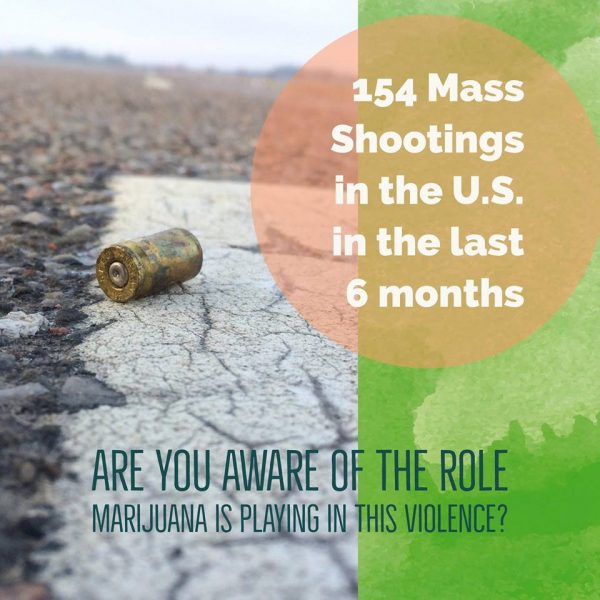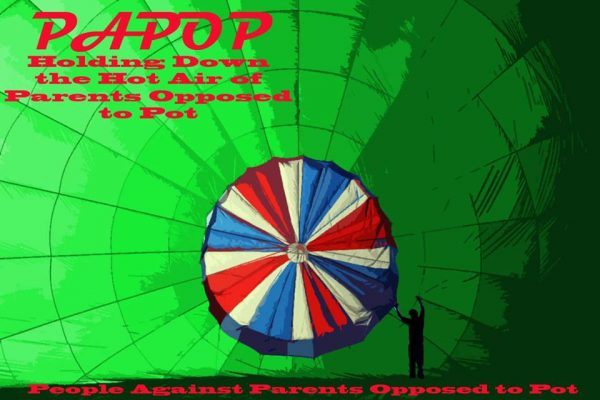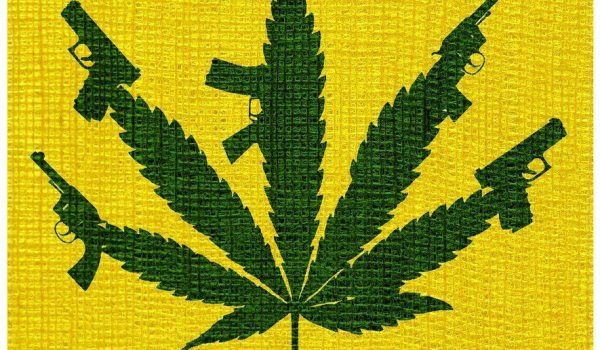A group of parents focused on America’s mass shootings is seeding a theory that marijuana is a catalyst influencing the violence we are experiencing. Specifically, a bunch of moms and dads are emphasizing mass shooting incidents are triggered by cannabis use among assailants. Pinning it on pot, Parents Opposed to Pot (POP) poses the question: “Are you aware of the role marijuana is playing in the violence?”
I can’t say that I am privy to whatever clinical, scientific, or evidentiary material they are basing their assertion(s) on. With a police career under my belt, and interactions with myriad marijuana users exhibiting peace, joy, and mellowness, I have a difficult time making the connection between weed and any violent behavior. Nevertheless, I set out to unearth information on POP’s assertion that weed is the root of calamitous transgressions culminating in weaponized violence. As mentioned, no pothead I ever encountered as a policeman ever exhibited malice toward me or anyone else for that matter. I am piqued.

The research process offers a plethora of marijuana-related dividends stemming from our nation’s majority shift toward forms of legislation scoping the natural budding of cannabis and its medicinal constructs versus its purported detractors (violence and trigger-pulling).
From what I can gather, POP’s supposition is based on research studies which claim marijuana use triggers violent behavior in those suffering PTSD and worsens the disorder’s impacts. To arrive at this, they cite two particular studies. One research project published in the Journal for Clinical Psychiatry (J Clin Psychiatry. 2015 Sep;76[9]:1174-80.) wages “Marijuana use is associated with worse outcomes in symptom severity and violent behavior in patients with posttraumatic stress disorder.” Other studies claim just the opposite; we’ll get into that in a moment.
The Veterans Administration explains some middle-ground hypotheses, saying, “Marijuana use is associated with medical and psychiatric problems. These problems may be caused by using, but they also may reflect the characteristics of the people who use marijuana. Medical problems include chronic bronchitis, abnormal brain development among early adolescent initiators, and impairment in short-term memory, motor coordination and the ability to perform complex psychomotor tasks such as driving. Psychiatric problems include psychosis and impairment in cognitive ability.” Sift-out “impairment in…the ability to perform complex psychomotor tasks such as driving” and one may wonder if that relates to the mechanisms of a firearm and one’s capacity to handle guns.
But steering a wheel and wielding a firearm is secondary to the compulsion to use either, frankly, as a malicious vessel against humanity. If senses are too dull to steer a Fiat or bounce on a Pogo stick, wouldn’t inclinations to discharge a gun be beyond the bleachers in terms of consideration and motivation?
The aforementioned VA materials appeared and were updated on May 10, 2017. In that same marijuana/PTSD bulletin is the following: “The belief that marijuana can be used to treat PTSD is limited to anecdotal reports from individuals with PTSD who say that the drug helps with their symptoms. There have been no randomized controlled trials, a necessary ‘gold standard’ for determining efficacy. Administration of oral CBD [Cannabidiol] has been shown to decrease anxiety in those with and without clinical anxiety.”
There is a growing body of readily available real-life anecdotal examples portrayed by PTSD sufferers who use cannabis to sort through the disarray of the disorder. Among the cannabis/PTSD momentum, every source I found was in the affirmative as to relief and relative normalcy. “Grounded” is the word most use to describe their pleasant effects of pot.
Going all the way back to May 23, 2001, writing for the Washington Post, Judy Mann reported, “Marijuana itself does not induce violence. People don’t smoke a joint and decide to shoot somebody. What produces the violence associated with marijuana is that it is illegal. The same dynamic caused the murderous Capone-style violence during Prohibition. And once Prohibition was repealed, the violence associated with the bootleg trade vanished, although the gangsters that it spawned did not. Before any sensible discussion can take place about how to deal with illegal drugs in the United States, we must make the distinction between violence associated with a drug and violence associated with the drug trade.”
Albeit a bit dated, the other study proffered by the anti-weed folks was produced in the Journal of Addictive Diseases (Vol 20[1], 2001,pp. 49-72.) claiming “Marijuana users [are] nearly as likely to engage in violent behaviors as crack users.” As a cop (retired), I can say that boggles my mind. Between both drug classes, I never saw one speck of evidence to support that study’s claim.
Bolstering those studies and the POP contention is Roger Morgan, an apparent soldier in the marijuana debate purporting weed’s harmful effects and its full metal jacket-like impacts. Posted in Merry Jane, Morgan claims “There’s thousands of studies” containing “brain scan technology” proving smoking cannabis triggers “psychotic breaks.” Merry Jane published the story “Marijuana and Mass Murder” in May 2016, in which the opening context cites Mr. Morgan: “Every time a bunch of innocent people are massacred, most of us are revulsed. Some of us seek answers in public policy and history. Others look to psychology. Roger Morgan blames pot.
“It’s pretty much all he does. Morgan, who runs California’s Stop Pot initiative, recently told libertarian site Reason, ‘what hasn’t been publicized widely is that almost all of the mass murders that we’ve had in recent years, the person has been a heavy marijuana user, because it changes the brain. If you look at the Tucson shooting, Aurora, Paris recently, the guy was a complete stoner…even the radical Islams are doing it, that’s how they change the motivation of younger people is they give them marijuana.'”
I’m intrigued by that last part having to do with ISIS clones generated and motivated by the use of marijuana, an organic basic sedative resulting in relative demotivation. That’s a new one. Here, again, Morgan’s finger-pointing is only on pot and not myriad other factors we see in the lives of mass murderers.
A testimony posted on POP’s site entails a father whose son reportedly suffered schizophrenia and, in his own words, fielded and answered the question How can you be sure marijuana triggered your son’s illness? He conveyed, “I can’t for a hundred percent say that that’s the case. But I do know it was a trigger.” All due respect to this dad and his son, nothing substantive there. The gentleman goes on to explain how “mental illness is a black hole” which sucks resources until the well is dry. Pursuant to that, he labels cannabis use and “triggers” as “weaponized marijuana.” Respectfully, I do not know if he was making some sort of subconscious loop to firearms used by those high on weed or relating pot smoking to ideations of others (POP’s or Mr. Morgan’s diatribe).
Without encumbering ourselves with the time investments it takes to scour longitudinal studies, scientific experiments, lab rats’ indicators, and a litany of white papers which may or may not even exist, I thought it prudent to cursory-scan materials having to do with shooters high on weed and institutions debunking claims of harmful marijuana.
In 2015, the Western Journal republished a piece on the Charleston, S.C. mass shooting at church in which the assailant was reportedly abusing suboxone, a narcotic used to treat heroin, methadone, and opioid addiction. That shooter was Dylann Roof whose friend John Mullins claimed “He used drugs heavily a lot. It was obviously harder than marijuana. He was like a pill popper, from what I understood. Like Xanax and stuff like that.” There is no argument against marijuana there but, instead, consensus that hardcore narcotics were involved.
Mental Health Daily asserts the adverse reactions stemming from Suboxone use are deep depression and dysphoria, anxiety, confusion, mood swings, depersonalization, irritability, and “fear of going crazy” which are especially heightened during periods of withdrawal.
In all, no indication Roof necessarily used marijuana and, if he did, it was superficial compared to heavy-hitting pills.
In his book “How Evil Works” author David Kupelian writes it is “simply indisputable that most perpetrators of school shootings and similar mass murders in our modern era were either on–or just recently coming off of– psychiatric medications.” No hint of marijuana there either; cannabis is not a psychotropic.
Writing for WND.com, Leo Hohmann indicated, “From Adam Lanza at Sandy Hook Elementary, to Columbine mass killer Eric Harris, all had been taking some form of mind-altering drugs.” No suggestion of marijuana. The most static thing about weed is it slows the user’s roll—literally and figuratively—hardly an aggressive dynamic.
An August 2014 study I found, published in the Journal of Psychology and Addictive Behaviors, posited that intimate couples who smoked marijuana together had a decreased rate of domestic violence:
https://youtu.be/WrdQL6gpFKw
For Every Action, A Reaction
In rather self-explanatory fashion, Parents Opposed to Pot have their critics and subject matter adversaries. I found two groups pushing back against POP. Ready? Parents Opposed to Parents Opposed to Pot (POPOP) as well as People Against Parents Opposed to Pot (PAPOP) repel the marijuana generates violence assertions proffered by anti-weed sorts.

For what it is worth, a perusal or definitive study of POP’s website will deliver a common denominator: marijuana is good for nothing and harmful in whatever the mind can muster. They post a string of anti-pot materials and not one piece of literature countering any argument for cannabis.
To be fair…POP folks got it right in an entirely different instance in which guns and weed were intertwined, lambasting an irresponsible pot-smoking parent.
A May 26, 2018 example came with a tragic twist which POP justly harped on. A 27-year-old father who toked weed and fell asleep with his loaded handgun within reach of his children awoke to find his 2-year-old son shot himself in the head. Doctors determined the boy’s life was not sustainable; organ donation procedures were commenced. Among several charges, the dad was arrested for manslaughter. Granted, this is a horrific case having roots in weed, but it does not rise to the level of POP’s argument that when one smokes pot, he/she has a propensity to go shoot humans. It does, however, exemplify that POP is unequivocally anti-pot in every context.
Railing against POP’s position that marijuana cultivates gun violence, Glenn Piotrowski posted directly to POP’s site with sentiments many may readily relate to: “This has to be worse than reefer madness. I understand educating people on actual negative side-effects of marijuana (very manageable), but this is out of hand. We can’t just point the finger because of one or two idiots. All states and countries that legalized are seeing vast improvement in many areas. Yes, some states may have trouble due to other factors…but irrelevance and minor lag aren’t reasons to lash out. This page is ridiculous. I honestly added this sh!t because I thought it was a parody page.”
Afraid it is real, Mr. Piotrowski. As we are all well aware, Facebook is replete with propaganda machines posting baseless assertions and melodramatic memes.

Point/Counterpoint
As a cancer patient, I would rather be satiated by pot than to undergo the traumatic physical and emotional impacts of chemotherapy. Indeed, chemo is designed to combat cancer whereas cannabis has sedative benefits. One can definitely allay the effects of the other. But does cannabis go beyond satiation for cancer patients? According to Miracles of Cannabis, “Now, in a stunning, though quiet, feat of acknowledgment, the U.S. National Cancer Institute (NCI) has admitted that cannabis kills cancer cells without harming normal cells.” So there’s that Ah-a moment.
As a father trying to provide as much normalcy to my child who battles “severe autism” with comorbidities of self-injurious behaviors (SIBs), assaultive behavior, high anxiety, bipolar traits, and an inexplicable desire to remain awake for days…I implore the legalization of cannabis for the autistic community in particular. The success stories mounting daily, depicting autistic children relatively settled from a crisis-ridden life, debunks anything having to do with aggressive characteristics, let alone the supposed propensity to go spray bullets all over any landscape.
As a policeman (retired), I have had zero contentious incidents in which weed was involved. Now that I think back, only pipes for smoking and papers for rolling were found on folks with whom I made contact; nary a weapon or designs on creating mayhem. Pointedly, the wit of pot users is diminished which makes the argument (opposition) more for “driving while baked” (high on pot) than other empty accusations (pot creates gun-slinging monsters).
If organizations defying marijuana are picking at soundbite-type aspects to bolster campaigns against weed, to stir the pot, and to reverse course in efforts to overthrow what the majority of Americans clearly voted for, then choosing a verifiable argument supported by objectively-researched statistics would be the credible thing to do.
Anyone can claim something and publicize materials (propagandize) to the masses. But absent verifiable data to support said claims is akin to making empty promises motivated by biased agenda fulfillment. Some may equate this as acting under the guise of one thing to achieve an entirely different objective. The term “slight of hand” comes to mind, and that still begs the question Why? Having to do with POP’s topic—mass murderers—is it because striking the Second Amendment from the US Constitution is glaringly unwinnable? Does that make cannabis easier prey?
“Should kids use cannabis? Of course not, I don’t think anyone would dispute that. Should you spread falsehoods, outright lies, and other reefer madness propaganda to further the company agenda? An even bigger no. Don’t believe the hate speech found here. Do your own research, the truth is out there,” wrote Chris Frazier on the POP site.
There is always the equation of scientific study and empirical evidence versus hyperbolic memes and statements made without supportive proof. Inconclusive? Anecdotal? Circumstantial? What are we dealing with here, POP?
Playing devil’s advocate, I believe that if there were any such scientific results demonstrating pot puts the gun in the hands of mass shooters, that would be blasted all over media channels and print materials like it reporting the outbreak of WWIII. It is not. And I would be first in line to write about inherent fact-based components.
What are your thoughts on this topic and POP’s claims? Go check out the POP Facebook page and see if you can decipher where (if) they posted concrete evidence that mass shooters visit their brand of mayhem because of cannabis. Take note of the articles denouncing pot as the sinister monster causing every unthinkable incident imaginable; each and every piece was written by a POP staff member (denoted by POPPOT.org), not objective external sources.
I side with Tom McKay who wrote the article in Merry Jane denoting Mr. Morgan’s pinning-it-on-pot platform: “I reached out for comment from Morgan several times, but he repeatedly dodged setting a concrete time to talk. Fortunately, it’s not hard to suss out all the relevant details of his suspiciously poorly sourced ideology online.” That sounds like a one-size-fits-all for anti-pot enthusiasts who weakly (if at all) support their cannabis arguments and contentions.
Stop blowing smoke. Show us science. Display statistical data. Reveal evidence to pillar claims.
















